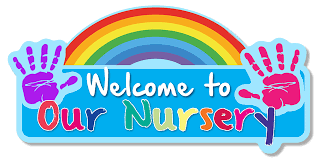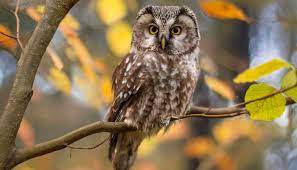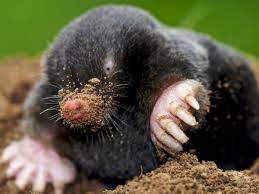Nursery
Nursery Showcase
Welcome to our Nursery web page! Here you will find lots of information about Nursery. We hope you enjoy viewing our web page and discovering more about what we have been learning about in school.

Meet the team

Mrs Bayley - Nursery Teacher

Mrs Lowe - Nursery Teacher

Miss Stokes - Nursery Learning Support

Mrs Atherton - Nursery Learning Support
Nursery family group names
Our Nursery family group names are rabbits, moles and owls.



Nursery start and end of day handover information
At the start of the day the gates are open at 8.45am. Children and adults/carers are to line up by the Nursery paddock gate located on the Key Stage One playground. A member of the Early Years team will be on the gate to welcome the children into school. Any messages can be passed onto the member of staff who will relay this back to your child's class teacher. If parents/carers do have a message or need to speak to a staff member please ensure this is done at the end, so staff can ensure children are safe on site during morning handover.
The bell at the end of the school day is 3:30pm. The school gates will be open at 3.25 for parents to begin to line up outside the Nursery paddock. Children will be released through the gate at 3:30pm.
Handover at start of the school day
All children must be accompanied onto school site by an appropriate adult and observed entering the school site. This is a parental responsibility. NO children should walk to school unaccompanied.
Collection from school at the end of the school day
All children will be collected by an appropriate adult at the end of the school day.
Keeping Nursery pupils safe
During release, it is vital that safeguarding is maintained and children are collected promptly and safely. If for any reason you have to send an alternative adult to collect your child, please ensure you inform the school office. They will ensure this information is passed onto the Nursery team.
These are extracts from our Positive Interactions Policy.
Protective behaviours
We have a Protective Behaviours culture and children regularly identify and update their Network Hand. This ensures that children know which adults they can approach if they are worried, however ‘awful or small’.
Proactive social media reminders
We send regular and proactive reminders to parents regarding social media and always request you check pupil devices regularly and have full access to all their devices and accounts. By working together in this way we work towards keeping pupils safe.
Learning 4 Life
Our Learning for Life lessons allow us to be proactive with teaching children how to keep themselves safe, learn about relationships education, relationships and sex education and health education.
Nursery Curriculum Overview
We follow the Early Years Foundation Stage Curriculum focusing on the ‘Seven Areas’ of learning. Themes and topics are set around texts and follow children’s interests. We find that this helps to engage and enthuse the children, encouraging them to be active learners.
Our provision includes an exciting range of learning opportunities and a varied daily programme of teaching. This includes daily Phonics sessions, maths and literacy focuses. The provision is tailored to meet the needs of individual children; often linking to their interests. The learning is differentiated to support children’s needs.
The Early Years Curriculum is divided into two main areas, the prime and specific areas. The prime areas form the foundations of your child's learning. These foundations can then support your child to access the specific areas. The areas are interlinking and form a holistic approach to learning.
Prime Areas
Communication and Language
•Listening Attention
•Understanding
•Speaking
Personal, Social and Emotional Development
•Self-regulation
•Managing Self
•Building Relationships
Physical Development
•Gross Motor Skills
•Fine Motor Skills
Specific Areas
Literacy
•Comprehension
•Word Reading
•Writing
Mathematics
•Number
•Numerical Pattern
Understanding the World
•Past and Present
• People Culture and Communities
•The Natural World
Expressive Art and Design
•Creating With Materials
•Being Imaginative and Expressive
Preparing for ELG
At the end of Reception, your child will be assessed against the Early Learning Goals in the seven areas of learning. The ELG's support teachers to make a holistic, best-fit judgement about a child’s development, and their readiness for Year 1. When forming a judgement about whether an individual child is at the expected level of development, teachers will draw on their knowledge of the child and their own expert professional judgement. They will be reported as ‘emerging’ or ‘expected’. This will be communicated through their end of year report.
Communication and Language
ELG: Listening, Attention and Understanding
Children at the expected level of development will: - Listen attentively and respond to what they hear with relevant questions, comments and actions when being read to and during whole class discussions and small group interactions; - Make comments about what they have heard and ask questions to clarify their understanding; - Hold conversation when engaged in back-and-forth exchanges with their teacher and peers.
ELG: Speaking
Children at the expected level of development will: - Participate in small group, class and one-to-one discussions, offering their own ideas, using recently introduced vocabulary; - Offer explanations for why things might happen, making use of recently introduced vocabulary from stories, non-fiction, rhymes and poems when appropriate; - Express their ideas and feelings about their experiences using full sentences, including use of past, present and future tenses and making use of conjunctions, with modelling and support from their teacher. Teacher should be understood to refer to any practitioner working with the child.
Personal, Social and Emotional Development
ELG: Self Regulation
Children at the expected level of development will: - Show an understanding of their own feelings and those of others, and begin to regulate their behaviour accordingly; - Set and work towards simple goals, being able to wait for what they want and control their immediate impulses when appropriate; - Give focused attention to what the teacher says, responding appropriately even when engaged in activity, and show an ability to follow instructions involving several ideas or actions.
ELG: Managing Self
Children at the expected level of development will: - Be confident to try new activities and show independence, resilience and perseverance in the face of challenge; - Explain the reasons for rules, know right from wrong and try to behave accordingly; - Manage their own basic hygiene and personal needs, including dressing, going to the toilet and understanding the importance of healthy food choices.
ELG: Building Relationships
Children at the expected level of development will: - Work and play cooperatively and take turns with others; - Form positive attachments to adults and friendships with peers; - Show sensitivity to their own and to others’ needs.
Physical Development
ELG: Gross Motor Skills
Children at the expected level of development will: - Negotiate space and obstacles safely, with consideration for themselves and others; - Demonstrate strength, balance and coordination when playing; - Move energetically, such as running, jumping, dancing, hopping, skipping and climbing.
ELG: Fine Motor Skills
Children at the expected level of development will: - Hold a pencil effectively in preparation for fluent writing – using the tripod grip in almost all cases; - Use a range of small tools, including scissors, paint brushes and cutlery; - Begin to show accuracy and care when drawing.
Literacy
ELG: Comprehension
Children at the expected level of development will: - Demonstrate understanding of what has been read to them by retelling stories and narratives using their own words and recently introduced vocabulary; - Anticipate – where appropriate – key events in stories; - Use and understand recently introduced vocabulary during discussions about stories, non-fiction, rhymes and poems and during role-play.
ELG: Word Reading
Children at the expected level of development will: - Say a sound for each letter in the alphabet and at least 10 digraphs; - Read words consistent with their phonic knowledge by sound-blending; - Read aloud simple sentences and books that are consistent with their phonic knowledge, including some common exception words.
ELG:Writing
Children at the expected level of development will: - Write recognisable letters, most of which are correctly formed; - Spell words by identifying sounds in them and representing the sounds with a letter or letters; - Write simple phrases and sentences that can be read by others.
Mathematics
ELG: Number
Children at the expected level of development will: - Have a deep understanding of number to 10, including the composition of each number; 14 - Subitise (recognise quantities without counting) up to 5; - Automatically recall (without reference to rhymes, counting or other aids) number bonds up to 5 (including subtraction facts) and some number bonds to 10, including double facts.
ELG: Numerical Patterns
Children at the expected level of development will: - Verbally count beyond 20, recognising the pattern of the counting system; - Compare quantities up to 10 in different contexts, recognising when one quantity is greater than, less than or the same as the other quantity; - Explore and represent patterns within numbers up to 10, including evens and odds, double facts and how quantities can be distributed equally.
Understanding the World
ELG: Past and Present
Children at the expected level of development will: - Talk about the lives of the people around them and their roles in society; - Know some similarities and differences between things in the past and now, drawing on their experiences and what has been read in class; - Understand the past through settings, characters and events encountered in books read in class and storytelling.
ELG: People, Culture and Communities
Children at the expected level of development will: - Describe their immediate environment using knowledge from observation, discussion, stories, non-fiction texts and maps; - Know some similarities and differences between different religious and cultural communities in this country, drawing on their experiences and what has been read in class; - Explain some similarities and differences between life in this country and life in other countries, drawing on knowledge from stories, non-fiction texts and – when appropriate – maps.
ELG: The Natural World
Children at the expected level of development will: - Explore the natural world around them, making observations and drawing pictures of animals and plants; - Know some similarities and differences between the natural world around them and contrasting environments, drawing on their experiences and what has been read in class; - Understand some important processes and changes in the natural world around them, including the seasons and changing states of matter.
Expressive Arts and Design
ELG: Creating with Materials
Children at the expected level of development will: - Safely use and explore a variety of materials, tools and techniques, experimenting with colour, design, texture, form and function; - Share their creations, explaining the process they have used; - Make use of props and materials when role playing characters in narratives and stories.
ELG: Being Imaginative and Expressive
Children at the expected level of development will: - Invent, adapt and recount narratives and stories with peers and their teacher; - Sing a range of well-known nursery rhymes and songs; Perform songs, rhymes, poems and stories with others, and – when appropriate – try to move in time with music.
Nursery induction
Starting school can be a difficult time for young children; we therefore plan this time carefully to support children with the transition and to ensure continuity of learning, and it is as smooth as possible for each child and that they settle into their new class quickly and happily. At Temple Meadow, we recognise that starting school and moving up classes has the potential to be a stressful time for both children and parents. To this end, we have established a strong procedure for transitions to ensure that our children and parents are as confident and secure as they can be when facing the challenges of each year group. At any transition, we acknowledge the child has needs and establish effective partnership with those involved with the child and other settings.
Our Early Years Foundation Stage values the importance of a smooth transition into our team. Parents are invited to look around the school and are then invited to a meeting to ensure they know about school procedures, daily routines, and the environment and to get to know the staff. Parents are given a transition leaflet and an Early Years prospectus to take home. Staff then carry out a home visit to build a relationship with the parents/carers and the child and discuss the child’s interests, medical information and family. The parent/carer and child are then invited for a ‘settling in session’ where they get to visit their new environment and can meet new friends and their new teacher.
Nursery reading and home learning
As a school we follow the Little Wandle Letters and Sounds revised scheme. Your child will be heard read to once a week and a member of staff will write a comment in their reading record. Children's books will be changed weekly.
Your child will bring home a library and reading practice book that has been carefully matched to your child's current reading level. All children in Nursery will bring home a phase 1, lilac book which are wordless books. At the back of the books are questions and prompts to help support with engagement at home.
Listen to your child read the book each night. Remember to give them lots of praise-celebrate their success. If they can't read a word, read it to them. After they have finished, talk about the book together and write a comment in their reading record daily.
Book bags and reading records need to be in school daily.
In order to encourage your child to become a lifelong reader, it's important that they learn to read for pleasure. The sharing book is a book they have chosen for you to enjoy together. Please remember that you shouldn't expect your child to read this alone. Read it to or with them. Discuss the pictures, enjoy the story, predict what might happen next, use different voices for the characters, explore the facts in a non-fiction book. The main thing is that you have fun.
At Temple Meadow we believe that home learning provides additional learning opportunities for all pupils. It allows children to practise and rehearse key skills; to research and explore topics and ideas and to apply their learning in imaginative ways. We aim to provide opportunities to support key skills in Communication and Language, Phonics and Maths.
Home learning is issued on a Friday and is due in the following Wednesday.
Home learning consists of 1 x talking ticket based on the Phase 1 aspect they are learning and 1 x Maths task each week, linked to the learning that has taken place in school.
For children who are working on Phase 2 Phonics, staff will also upload the Phonic sounds and tricky words the children have been learning onto Tapestry with some fun games and activities to complete.
Should any of the Nursery pupils need support with their home learning, the Nursery teaching team can provide this throughout the week.
Water bottles and snacks
Children should make sure they bring a reusable water bottle into school daily - this must only contain water. Children can make use of our water machine to refill bottles. Please ensure water bottles are clearly labelled.
During snack time, children also have access to free milk and a range of fruit where we discuss healthy eating with the children and the benefits it has on their body.
During snack time, elements of the Personal, Social, Emotional Development curriculum are covered at this time and children are expected to wash their hands before eating and are encouraged to make healthy choices regarding their food. It is also a time when the class are able to come together and have a chat, to reflect on their learning and make relationships.
PE
In Nursery, during Autumn, Spring and Summer 1 our PE sessions are immersed through our curriculum and we learn new skills (gross motor and fine motor) outside in the Early Years environment.
In hot weather protection from the sun is advisable, therefore children can wear caps and loose clothing. Parents are advised to provide sun cream protection for children to self-apply.
To maximise safe and meaningful participation for all children the school and staff will use sensitive management when dealing with any concerns arising from the wearing of religious clothing.
There must be no jewellery worn during any PE sessions.
Personal items including religious items watches, hair slides and sensory aides including glasses should be removed. For those children who rely on glasses and other aids such as hearing, a risk assessment would determine what is appropriate.
Nursery parental support and engagement
At Temple Meadow, we strive to create and maintain partnership with parents and carers as we recognise that together, we can have a significant impact on a child’s learning. We welcome and actively encourage parents to participate confidently in their child’s education and care in numerous ways.
Working with other services and organisations is integral to our practice in order to meet the needs of our children. At times, we may need to share information with other professionals to provide the best support possible.
We draw on our links with the community to enrich children’s experiences by inviting members of the community into our setting, such as: the vet and firefighters.
There is a programme in place where health services come into school on a regular basis to check weight and height and vision. Health professions areas also invited into school to talk to the children about healthy lifestyles and how to look after their teeth. We also have close links with our school nurse who attends our parents evening to support any parents/carers with their child's toileting needs.
At Temple Meadow, we firmly believe that the Early Years cannot function without the enduring support of parents. We believe that parents and carers are a child’s first educator and therefore work very closely to ensure they are involved in what their child does at school. We want parents to feel they can speak to us about their child and to feel comfortable in our setting. Every term, parents have the opportunity to come to our ‘stay and play’ which gives them the opportunity to share their child’s learning environment, have time to talk informally with the staff and to meet other parents. We also offer parents a variety of learning workshops to provide advice and information on how they can support their child’s learning. Parents are welcomed and encouraged to share information about their child, to ask questions and to discuss their child’s learning with their teachers. Parents are also invited to termly parents’ evenings; however, the school has an open-door policy and parents are welcome to talk to teachers at the start and end of the school day.
At Temple Meadow we value the importance of the three-way relationship between children, parents and staff, as it enables children to make good progress and to maximise their potential. Parents can write observations on their child using Tapestry. These are an opportunity for all, to celebrate the children’s progress and achievements, and to share areas for further development.
Parents/carers are also informed on Tapestry any communication from the team about key events or general reminders.
Parents/carers have the opportunity to share weekend news on Tapestry, so children can share during circle time on a Monday which helps promote their listening and speaking skills.
Parents/carers also have the opportunity to be a ‘mystery reader’ on a Friday afternoon where they can read a story to our nursery/reception and share their favourite story. Photos are then added to our mystery reader floor book which is kept in our class book corner.
Life in Nursery






Nursery Visit from the Animal Lady
.jpeg) In March, the Animal Lady visited Nursery! We were so proud of how well-behaved and sensible our Nursery children were. They thoroughly enjoyed learning about the different animals and even holding and stroking the animals.
Please see the images below from the event.
In March, the Animal Lady visited Nursery! We were so proud of how well-behaved and sensible our Nursery children were. They thoroughly enjoyed learning about the different animals and even holding and stroking the animals.
Please see the images below from the event.